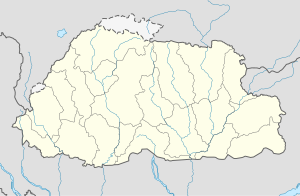Trashiyangtse
Trashi Yangtse
Tashi Yangtse | |
|---|---|
| Coordinates: 27°35′N 91°28′E / 27.583°N 91.467°E | |
| Country | |
| District | Trashiyangtse District |
| Gewog | Yangtse Gewog |
| Population (2005) | |
• Total | 2,735 |
| Time zone | UTC+6 (BTT) |
| Website | Official website |
Trashi Yangtse, located in the eastern part of Bhutan, is one of the 20 dzongkhag (districts) comprising Bhutan. It is further divided into eight gewogs.[1] It houses the Bumdeling Wildlife Sanctuary on the eastern tri-junction of Bhutan-India-China and to the east lies Tawang in India. The nearest airport is Yongphulla Airport 130 km away.
Its population in 2005 was 2735 and as of 2022. Located in close proximity to Chorten Kora stupa which lies to the west, a dzong was inaugurated in Trashiyangste in 1997. It contains a major art school, The School of 13 Traditional Arts, also known as Rigney School, which is a sister school of the Zorig Chosum School of Traditional Arts in Thimphu, and teaches six forms of art; painting, pottery, wood sculpture, wood-turning, lacquer-work and embroidery.[2]
Sacred sites
[edit]Chorten Kora, an important landmark located only 3 minutes from the main town. The chorten was constructed in the 17th century by Lama Ngawang Lodey to pacify a demon that terrorized the region. Legends say that a young Dakpa girl from Arunachal Pradesh, India believed to be a Dakini was buried alive in the stupa for the goodness of the mankind. [3][4]
See also
[edit]References
[edit]- ^ "14th Coronation Anniversary of His Majesty the King | TRASHI YANGTSE DZONGKHAG ADMINISTRATION". www.trashiyangtse.gov.bt. Retrieved 2023-07-04.
- ^ Pommaret, Francoise (2006). Bhutan Himalayan Mountains Kingdom (5th edition). Odyssey Books and Guides, p.266
- ^ Trashi Yangtse Series: The Sacred sites of Trashi Yangtse | EP 2, retrieved 2023-07-04
- ^ Delek, Tashi (2020-11-01). "Trashiyangtse". Tashi Delek Magazine. Retrieved 2023-07-04.
External links
[edit]- Satellite map at Maplandia.com
- Yangtse Gewog - official web page.

